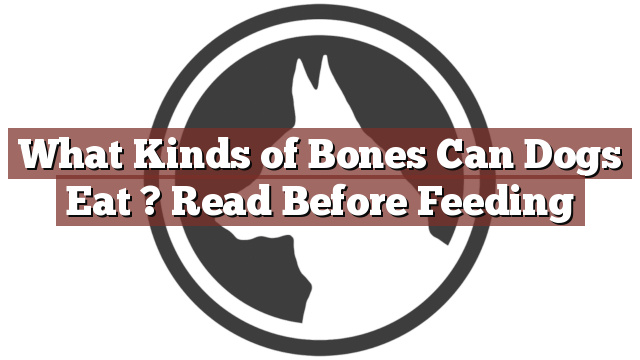Understanding Your Dog’s Dietary Needs
As a responsible dog owner, it is crucial to understand your furry friend’s dietary needs. Dogs are primarily carnivorous and require a diet rich in protein to maintain their overall health. While commercial dog food provides the necessary nutrients, many dog owners also like to supplement their pet’s diet with bones. However, not all bones are safe for dogs to consume, and it is essential to know which ones are suitable and which can be potentially harmful.
What Kinds of Bones Can Dogs Eat? Read Before Feeding
Can dogs eat bones? The answer is yes, but only certain types of bones. Raw bones that are large and weight-bearing, such as beef or bison femur bones, are generally safe for dogs to chew on. These bones are dense and provide mental stimulation, exercise for their jaw muscles, and help keep their teeth clean. Additionally, raw bones are a great source of calcium and other essential minerals.
However, it is crucial to note that cooked bones should never be fed to dogs. Cooking makes bones brittle, causing them to splinter easily, which can lead to choking hazards and serious internal injuries. Similarly, small bones, like chicken or fish bones, should also be avoided as they can easily break and cause harm to your dog’s digestive system. It’s always best to consult with your veterinarian before introducing bones into your dog’s diet.
Pros and Cons of Feeding Bones to Dogs
Feeding bones to dogs can have several advantages. Chewing on bones provides mental stimulation and helps alleviate boredom, especially for aggressive chewers. Bones can also help keep their teeth clean by scraping away plaque and tartar buildup. Moreover, the act of gnawing on bones can help exercise their jaw muscles, promoting good oral health.
However, there are also potential risks associated with feeding bones to dogs. As mentioned earlier, cooked bones can splinter easily and cause serious injuries to your pet. Additionally, if your dog swallows large pieces of bone, it can lead to choking or blockages in their digestive system, requiring immediate veterinary attention. Some dogs may also experience upset stomachs or gastrointestinal issues after consuming bones.
In Conclusion: Considerations for Feeding Bones to Your Dog
Before feeding bones to your dog, it is crucial to assess the risks and benefits. Always choose raw, large, and weight-bearing bones from reputable sources. Monitor your dog while they chew to ensure they are not splintering or swallowing large pieces. If you notice any signs of discomfort, vomiting, or difficulty passing stool, contact your veterinarian immediately. Remember, bones should only be given as an occasional treat and should never replace a balanced diet provided by commercial dog food. By understanding your dog’s dietary needs and making informed choices, you can ensure their overall well-being and safety.
Thank you for taking the time to read through our exploration of [page_title]. As every dog lover knows, our furry friends have unique dietary needs and responses, often varying from one canine to another. This is why it's paramount to approach any changes in their diet with caution and knowledge.
Before introducing any new treats or making alterations to your dog's diet based on our insights, it's crucial to consult with a veterinarian about [page_title]. Their expertise ensures that the choices you make are well-suited to your particular pet's health and well-being.
Even seemingly harmless foods can sometimes lead to allergic reactions or digestive issues, which is why monitoring your dog after introducing any new food item is essential.
The content provided here on [page_title] is crafted with care, thorough research, and a genuine love for dogs. Nevertheless, it serves as a general guideline and should not be considered a substitute for professional veterinary advice.
Always prioritize the expert insights of your veterinarian, and remember that the health and happiness of your furry companion come first.
May your journey with your pet continue to be filled with joy, love, and safe culinary adventures. Happy reading, and even happier snacking for your canine friend!

